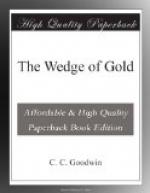Two kinds of sorrow.
But as June wore away, one day when Jack visited the office of his step-father, he found Stetson there, and was informed by him that some evil-disposed persons were ‘bearing’ the stock of the Wedge of Gold Company, which was most unfortunate, as it interfered with the arrangements in progress for building the mill.
Browning did not know enough about stocks to see through the deception, but bluntly asked what could be done to stop the injury. “The true way,” said Stetson, “would be to go on the market and take all the stock offered until the bear movement should be broken.”
Browning had heard about Captain Kelly “bearing” the bonanza stocks, and how the bonanza firm had taken all he offered, so he said: “Why do you not go out and put a stopper on the beggars?” Stetson explained that he had not the money. “Why, we can fix that,” said Jack. So he wrote a note to the —— Bank to honor the orders of Jenvie & Hamlin until further instructions, turned the check over to Hamlin and told him to manage it. The days went by. There was an excursion of the young people to Wales, and another to Scotland, and besides Jack had gone down to Devonshire, bonded the place he liked, paid L1,000 down, and was to meet the remainder of the obligation—L9,000—when the titles were all looked up and transferred to him. Meanwhile, June and the better part of July were gone when one morning Jack went to the bank and drew a check for a few pounds which he needed for spending money. The cashier as he paid the check, informed Browning that the directors would be glad to see him in the private office of the bank. A messenger showed him the way, and he was there informed that the house of Jenvie & Hamlin had been drawing so heavily upon his order that only some L12,000 remained to his credit. The news was a paralyzer, but Jack was a game man and said: “That is all right,” talked pleasantly for a few minutes, then withdrew, and going directly to his step-father’s office, demanded an explanation.
The old men informed him that they had tried to hold up the stock of the “Wedge of Gold,” but their efforts had proved of no use. The shares had run down to almost nothing. They had even used the reserve fund intended for the building of the mill, and it looked, they said, as though they could never realize enough to get even.
“Has the stock recently bought been placed to my credit?” asked Jack. He was told that it had been. “And how much is it?” he demanded. They informed him that it amounted to 83,000 shares, which, with the 50,000 shares first bought by him, gave him 133,000 shares, or the entire stock except 17,000 shares.
Jack was lost in thought a few minutes, then said: “I want all the papers except the 17,000 shares, and I want with them your own and Stetson’s resignation as officers of the company.”
The papers were given him, and taking the bundle he carried it to his own bank and deposited it, then went home.




